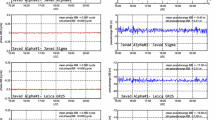Abstract
This study is aimed at evaluating the trade-off between Global Positioning System (GPS) accuracy and power saving from reduction of number of channels. The study is conducted for number of GPS receiver channels of 4 to 12 for two scenarios: (1) normal scenario with full range of available GPS satellites and (2) obstruction scenario with GPS satellite elevation cutoff of 20°. It is observed that increase of power saving from reducing the number of channels causes increase of probable error values. This is due to increasing position dilution of precision (PDOP) of the reducing number of GPS satellites tracked. However, reduction of number of channels to match the number of available GPS satellites does not cause degradation of accuracy, as there is no reduction in number of trackable GPS satellites. For the obstruction scenario, with significantly fewer available GPS satellites due to the GPS satellite elevation cutoff, significant power saving can be achieved without degradation of accuracy. An effective power saving system would require the management of minimum number of channels required to achieve the user’s minimum required accuracy.




Similar content being viewed by others
References
Aeroflex (2010) Avionics GPSG-1000 GPS/Galileo portable positional simulator. Aeroflex Inc., Plainview, New York
Aloi DN, Alsliety M, Akos DM (2007) A methodology for the evaluation of a GPS receiver performance in telematics applications. IEEE T Instrum Meas 56:11–24
Brown, AK, Reed, D (2011). Dynamic reconfiguration in a GNSS software defined radio for multi-constellation operation. Proc. ION GNSS 2011, September 2011, Portland, Oregon
CNET (2010) GPSDiag 1.0. http://download.cnet.com/GPSDiag/3000-2130_4-4951103.html. Accessed 31 January 2010.
Dinesh S, Wan Mustafa WH, Mohd Faudzi M, Kamarulzaman M, Hasniza H, Nor Irza Shakhira B, Siti Robiah A, Shalini S, Jamilah J, Aliah I, Lim BT, Zainal Fitry MA, Mohd Rizal AK, Azlina B, Mohd Hasrol HMY (2010) Evaluation of the effect of radio frequency interference (RFI) on Global Positioning System (GPS) accuracy. Defence S&T Tech Bull 3:100–118
Dinesh S, Mohd Faudzi M, Zainal Fitry MA (2012) Evaluation of the effect of radio frequency interference (RFI) on Global Positioning System (GPS) accuracy via GPS simulation. Defence Sci J 62:338–347
Dinesh S, Shalini S, Zainal Fitry MA, Siti Zainun A (2013) Evaluation of the repeatability of Global Positioning System (GPS) performance with respect to GPS satellite orbital passes. Defence S&T Tech Bull 6:130–140
Dinesh S, Mohd Faudzi M, Rafidah M, Nor Irza Shakhira B, Siti Robiah A, Shalini S, Aliah I, Lim BT, Zainal Fitry MA, Mohd Rizal AK, Mohd Hasrol Hisam MY (2014a) Evaluation of the effect of radio frequency interference (RFI) on Global Positioning System (GPS) receivers via GPS simulation. ASM Sci J 8:11–20
Dinesh S, Shalini S, Zainal Fitry MA, Siti Zainun A, Siti Robiah A, Mohd Idris I, Mohd Hasrol Hisam MY (2014b) Evaluation of the effect of commonly used materials on multipath propagation of Global Positioning System (GPS) signals via GPS simulation. Adv Mil Tech 9:81–95
Dinesh S, Shalini S, Zainal Fitry MA, Asmariah J, Siti Zainun A (2015a) Evaluation of the effect of Global Positioning System (GPS) satellite clock error via GPS simulation. Defence S&T Tech Bull 8:51–62
Dinesh S, Shalini S, Zainal Fitry MA, Asmariah J, Siti Zainun A (2015b) Evaluation of the accuracy of Global Positioning System (GPS) speed measurement via GPS simulation. Defence S&T Tech Bull 8:121–128
DOD (Department of Defence) (2001) Global Positioning System standard positioning service performance standard, command, control, communications, and intelligence. Department of Defence (DOD), Washington D.C.
Fawaz MJ, Hashim SJ, Roslina MS, Fakhrul Zaman R (2013) Low power GPS baseband receiver design. 2013 4th Annu Int Conf Energy Aware Computing Syst Appl (ICEAC 2013), 16–18 December 2013, Istanbul
Garmin (2007) GPSmap 60CSx Owner’s Manual. Garmin International Inc., Olathe, Kansas
Kamarulzaman M (2010) Technical specification for STRIDE’s mini-anechoic chamber. Science &Technology Research Institute for Defence (STRIDE), Ministry of Defence, Malaysia
Kaplan ED, Hegarty CJ (2006) Understanding GPS: principles and applications. Artech House, Norwood, Massachusetts
Kou Y, Zhang H (2011) Verification testing of a multi-GNSS RF signal simulator. Inside GNSS 6:52–61
Liu J, Priyantha B, Hart T, Ramos HS, Loureiro AF (2012) Energy-efficient GPS sensing with cloud offloading. 10th ACM Conf Embedded Networked Sens Syst (SenSys 2012), 6–9 November 2012, Toronto
Misra P, Hu W, Jin Y, Liu J, De Paula AS, Wirstrom N, Voigt T (2014) Energy efficient GPS acquisition with sparse-GPS. 2014 ACM/IEEE Int Conf Inf Proc Sens Netw (IPSN’14), 15–17 April 2014, Berlin
Namgoong W, Reader S, Meng TH (2000) An all-digital low-power IF GPS synchronizer. IEEE J Solid-State Circuits 35:856–864
Paek J, Kim J, Govindan R (2010). Energy-efficient rate-adaptive GPS-based positioning for smartphones. 8th Annu Int Conf Mobile Syst Appl Serv (MobiSys’10), 15–18 June 2010, San Francisco, California
Petovello M (2009) Carrier-to-noise density and AI for INS/GPS integration. Inside GNSS 4:20–29
Pozzobon O, Sarto C, Chiara AD, Pozzobon A, Gamba G, Crisci M, Ioannides R (2013) Developing a GNSS position and timing authentication testbed: GNSS vulnerability and mitigation techniques. Inside GNSS 8:45–53
Trimble (2015) Trimble’s Planning Software. http://www.trimble.com/planningsoftware.shtml. Accessed 13 October 2015.
USACE (US Army Corps of Engineers) (2011) Engineer manual EM 1110-1-1003: NAVSTAR Global Positioning System surveying. US Army Corps of Engineers (USACE), Washington D.C.
USCG (US Coast Guard) (2015). GPS NANUs, Almanacs, & Ops Advisories. http://www.navcen.uscg.gov/?pageName=gpsAlmanacs. Accessed 13 October 2015
Acknowledgments
The authors are grateful to Prof. Dr. Gethin Roberts, Dean of Science and Engineering, University of Nottingham Ninbo China, and two anonymous reviewers for their suggestions that have helped strengthen this manuscript.
Author information
Authors and Affiliations
Corresponding author
Rights and permissions
About this article
Cite this article
Sathyamorthy, D., Shafii, S., Amin, Z.F.M. et al. Evaluation of the trade-off between Global Positioning System (GPS) accuracy and power saving from reduction of number of GPS receiver channels. Appl Geomat 8, 67–75 (2016). https://doi.org/10.1007/s12518-015-0166-z
Received:
Accepted:
Published:
Issue Date:
DOI: https://doi.org/10.1007/s12518-015-0166-z




